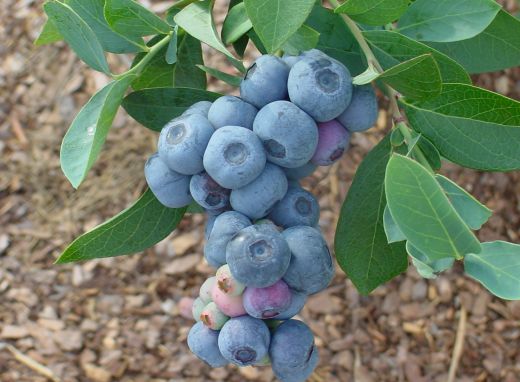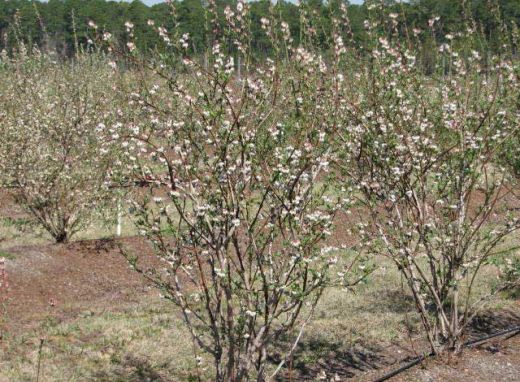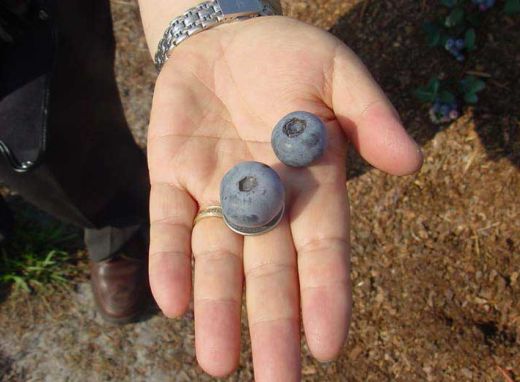At a Glance
Titan™ was released for commercial use as well as pick-your-own and homeowner markets. The plant has a high degree of vigor and is not unduly affected by blueberry pests or diseases.
Plants are upright, and crowns are narrow. Plants have responded well to pruning and hedging, reinvigorating easily with new healthy fruiting wood. This variety should be suitable for machine harvesting.
Fruit
Titan™ berry color and flavor are good, and dry scars contribute to good shelf life. Berries are very large, often exceeding 3 g/berry, which is larger than any rabbiteye released to date. Fruit are also very firm, and hang well on the plant when ripe. The ability to hang well allows for even greater berry sizes to be achieved as berry size continues to increase after fruit turn blue.
Cultivation
Titan™ is recommended where rabbiteye blueberries are grown successfully as a commercial, homeowner, and pick-your-own variety. The estimated chill requirement of the variety is 500 to 550 hours 45o F (7o C). It should be noted that Titan™ can have significant fruit cracking under wet conditions during ripening. This splitting is a physiological phenomenon, not completely understood, that occurs periodically after heavy rains that occur while the fruit is ripening.
The variety should be planted with other rabbiteye blueberries for cross pollination. Vernon is a recommended companion variety.
Development
Rabbiteye blueberry cultivars constitute the major portion of the Georgia blueberry industry because the species has high plant vigor and is highly adaptably in the Southeast. But the smaller berry size often diminishes the rabbiteye cultivars’ market potential to compete with larger fruit from highbush cultivars, especially in fresh markets. Rabbiteyes’ smaller berry size also makes harvesting by hand difficult, and UGA researchers had been breeding to develop larger fruit to resolve these issues when they developed Titan™.
Developed by D. Scott NeSmith of the University of Georgia, Titan™ is cross of T-460 and FL 80-11. It is a 2010 release by the University of Georgia College of Agricultural and Environmental Sciences and the University of Georgia Agricultural Experiment Stations. This protected blueberry variety can be sold only by individuals licensed by the University of Georgia Research Foundation (UGARF) and Georgia Seed Development (GSD). USPP applied for.
Breeder

D. Scott NeSmith
Dr. D. Scott NeSmith’s blueberry research program at the University of Georgia emphasizes new variety development as well as cultural management of blueberries for the southeastern United States.
Since taking over the UGA blueberry breeding program in 1998, Dr. NeSmith has released and patented 10 new commercial blueberry varieties and two ornamental blueberry varieties. His breeding program is now considered one of the most active low- to-mid chill blueberry programs in the world. He joined UGA in 1990.
Dr. NeSmith has expanded UGA’s program globally through collaborative projects throughout the U.S. and many other countries including South Africa, Argentina, Chile, Uruguay, Japan, Europe, Morocco, Australia, New Zealand, South Korea, Peru, and Mexico. Much of his cultural management research has been with growth regulators in blueberries. He also conducts experiments on plant establishment, pollination, and post-harvest quality.
Dr. NeSmith is a member of the American Society for Horticultural Sciences (ASHS) and the International Society for Horticultural Sciences. He is a past President of the Southern Region ASHS and has served as an Associate Editor for the ASHS journal, HortScience.
Dr. NeSmith has received the D.W. Brooks Excellence in Research Award from UGA and in 2011 was selected as a Fellow of the American Society for Horticultural Sciences. He has published more than 250 research papers, including more than 97 in refereed journals, and has received two awards for outstanding publications.
He graduated from the University of Georgia with B.S. and M.S. degrees. He obtained his Ph.D. from Michigan State University.
Affiliations
- Department of Horticulture
- University of Georgia, Griffin Campus


_3-year_old_plant__variety.jpg)

